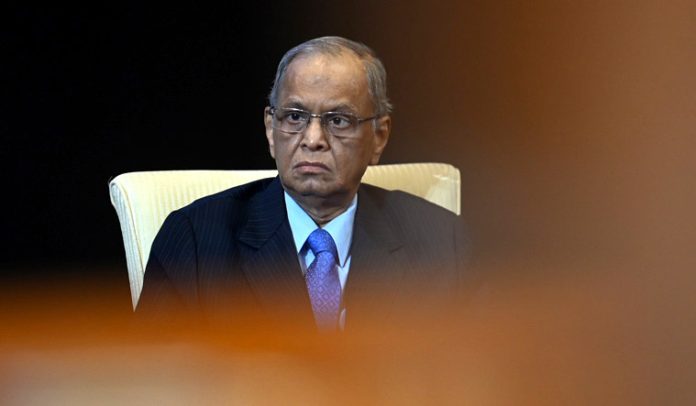K Raveendran
Infosys founder Narayana Murthy’s call to the youth of the nation to declare ‘this is my country, I want to work for 70 hours a week’ has created such a storm that it has elicited response from every section of the society, including the veteran technocrat’s peers, employers, corporate personalities and of course the working class. Most of it is negative and far removed from what Murthy may have envisaged when he made the call. The main ground for objection is whether the additional work would be compensated in terms of salary and other benefits.
Lamenting India’s work productivity record, Murthy said ‘unless we improve our work productivity, unless we reduce corruption in the government…unless we reduce the delays in our bureaucracy in taking decisions we will not be able to compete with those countries that have made tremendous progress’.
Also, the social media has spewed fire over Murthy’s suggestion to the youth to shun the habit of ‘taking not so desirable habits from the west and then not helping the country’. Obviously, since this touches an aspect of modernity that the new generation keeps close to heart, the reactions suffer from an overdose of emotions. But that should not take away the import of what Murthy has sought to convey. Of course, work and compensation are two sides of the same coin, but each has a value that goes beyond the relationship and must be evaluated separately. Compensation is certainly important, but the quality of work cannot be a function of compensation alone.
Murthy cannot be questioned on his lament that the productivity levels in India are abysmally low. According to ILO’s labour productivity statistics, India ranks behind most nations, including some of those which we Indians consider far below than us in terms of past, present and future. India’s score is several notches lower than, say, countries such as Iran, Egypt, Botswana, Turkmenistan, Belarus, Algeria, Jordan, Tunisia etc. To get an idea of how low it is, one only needs to consider how we rank relative to even Sri Lanka and Azerbaijan. In the neighbourhood, only Pakistan and Bangladesh perform poorly than India.
Productivity is calculated by dividing each country’s GDP by the average number of hours worked annually by all employed citizens. Hours worked include full-time and part-time workers, excluding holidays and vacation time. Accordingly, India’s score is $8.47, compared to $70.68 for the United States, $51.35 for the United Kingdom, $56.22 for Canada, $58.76 for Australia and $42.99 for the United Arab Emirates.
Worker productivity the world over has been declining in the last four decades, due to several reasons including the global financial crisis, Covid pandemic and slowing growth in the world economy. In effect, this means that people are working more, but producing less and less. According to experts, this is due to the fact that people are feeling more stressed and tired on the one hand, and skyrocketing cost of living is taking a heavy toll on worker productivity.
According to the study Global Productivity: Trends, Drivers and Policies, over the past decade, the global economy has been buffeted by a series of shocks that undermined productivity growth, of which Covid has been one of the latest. These shocks have compounded the erosion caused by an undercurrent of weakening fundamental drivers of productivity growth, associated with slowing progress achieved in convergence toward advanced economy productivity levels.
The likely adverse impact of the pandemic on productivity would be a worrisome outcome, because the growth of labour productivity is the main source of lasting per capita income growth, which in turn is the primary driver of poverty reduction. According to the study, most cross-country differences in per capita incomes have been attributed to differences in labour productivity.
When the pandemic struck the global economy, the world had already been witnessing a broad-based decline in productivity growth, which had affected about 70 percent of advanced economies and emerging market and developing economies. In fact, even in advanced economies, the prolonged deceleration in productivity growth before the pandemic sparked an intense debate on how it would evolve in the future. Some innovations that had held the promise of considerable productivity gains, including digital technologies and automation of production processes, seemed to have been disappointing in this regard.
The developing countries experienced the steepest, longest, and most synchronized productivity slowdown over recent decades. In these economies, decelerating productivity growth has put at risk hard-won gains in terms of catch-up with advanced economies. With India aiming to become the third biggest economy in the short term, this has serious implications. (IPA)


